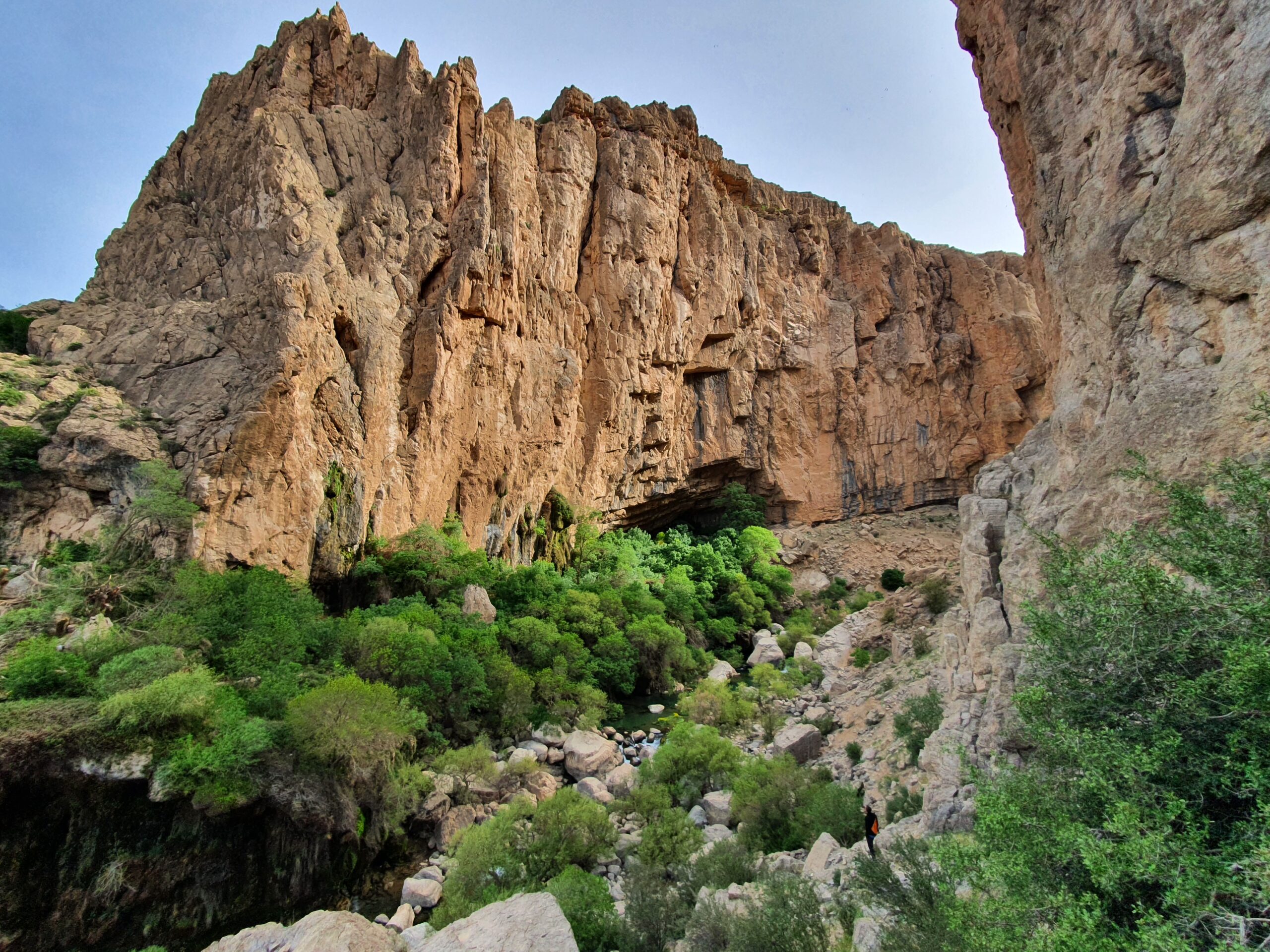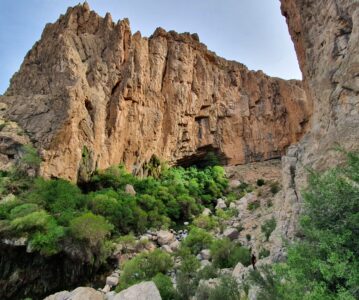A wonderful morning drive through the semi-desert and a purposeful car stop bring us back to civilization. The hills and expanses are still dust-dry and mostly bare, but pomegranate and other fruit trees are already being planted again in places. A windy climb brings us to our destination for the day, Eghlid. The supposed village turns out to be a lively small town, which as a small, green oasis does not at all suggest how dry and life-unfriendly the nearby surroundings are. Here, water suddenly flows again and the city impresses with wonderfully green avenues, parks, small groves of tree nut trees and incredibly friendly people. “The water flows here underground from Hamedan,” Mohammed claims later as he leads us to the mysterious spring in the city park. Crystal-clear, cold water bubbles up from the ground here and is channeled in countless streams and canals through the small town and into the surrounding fields. An underground river from Hamedan? This seems a bit unbelievable to us, because Hamedan is about 800 kilometers away as the crow flies. Even the internet does not solve this mystery for the time being and so we just enjoy the greenery and the countless cordial encounters.
We barely reach the village border when Mohammed energetically waves us to his tractor. “Stay in my house tonight”, he types hastily into his cell phone. We could do with a shower, and so we gladly let the engaging man invite us in. Soon it turns out that he apparently owns several houses and we have a huge apartment to ourselves. We are a bit unsure about the conditions of this invitation, but soon it becomes clear: payment is out of the question, wife and child are visiting family elsewhere and therefore we will go to the restaurant together tonight; no point in arguing back. Two hours later Mohammed picks us up for dinner in his starting clothes. First he proudly shows us his city. It is already getting dark, but Mohammed does not let himself be lumpen. We drive through the town from the sugar factory to the aforementioned spring and Mohammed shows his talent in multitasking: He drives a car, types sentences into the translation app, and curses the “turban man” who only brings harm to Iran and is not good for anything at all. He energetically suggests a turban, shapes his hand into a gun, and makes shooting noises. “No good man!” he adds firmly.
Mohammed is by no means alone in his decided opinion. Wherever we go, people complain loudly about the political regime in Iran, which makes life difficult for everyone. In some cases, we are surprised at the clear opinions that are expressed publicly. Even if the portrait of the “turban man” is omnipresent, the people we meet rarely seem to like him. “Iran people very good, politic not good,” is a statement we often encounter. Anyone who criticizes and is heard by the wrong ears quickly ends up in jail here. Political counter-movements are nipped in the bud, and so discontent ferments and festers in secret.
Our tour through Eghlig ends in front of a rather noble-looking restaurant. Our concern that Muhammad was going to give himself away for us financially is fortunately unfounded. Despite the noble appearance, old and young seem to dine here and so we enjoy the unusual meat bouquet that Mohammed orders for us.
The next morning Mohammed reappears in his farmer outfit and sets out to plant little trees. We also pack and soon pedal over the highest pass Timar Jan of our trip so far. Since we are still high up, the 2800 meters are soon done and we are rewarded with the descent into the next valley. Tonight we are invited again. Our host has convinced us right after the village border of Eghlid with a lot of wit and charm to spend the night with him and his parents tonight. His name is also Mohammed and he tells us about his life in the evening. He is old enough to remember the time before the revolution and to rave about the old, better times together with his father. After the revolution came the war with the big neighbor Iraq and his older brother also went off to fight for the fatherland. The brother never returned home and it was clear that Mohammed, who was only 16 years old, now went to war to avenge his brother. “I needed to kill Iraqis,” Mohammed comments. After the war, he was pressured by family to marry his brother’s widowed wife, which he did reluctantly. “She was like my sister, I could not love her,” he complains. An aunt recommended fathering a child to save the marriage, which also happened, followed by years of opium addiction that robbed Mohammed of sleep and left him working five jobs at once. Eventually the body had enough, the marriage was divorced, the son a stranger, and today Mohammed teaches English, cares for his elderly parents and dreams of a different life. He’s long past the addiction, but still seems erratic and driven. He is excited about our way of traveling and like so many, envies us for it.
Life stories we can hardly imagine. War, family tragedies. Political circumstances that make it difficult or impossible to get ahead in life. We can only be grateful and meet the people we meet with empathy, patience and interest.
Now we are finally immersed in the natural splendor of Fars. In the next few days, each stage brings us to a wonderful place with waterfalls, forests and romantic agriculture. Grapes grow in low bushes next to pomegranate bushes, apricot and apple trees. Water is everywhere in abundance and impressive rocky flanks and ranges of hills frame the landscapes.
We discover fabulous gorges (Tange Boragh and Behesht-e-Gomshode) where we spend one night each. We are deeply impressed by the dimensions of these gorges, the wildness and the plant and bird life we encounter here.
There is also no lack of warm human contacts. In Tange Boragh, an excited group of young men turn out to be quite likeable contemporaries and we spend a cozy evening around the campfire with them.
Here we also get to know Afshin. The wiry outdoor-Iranian lives and works in Canada before the Corona period and fled to Iran for the duration of the pandemic, where life was much more relaxed; even during the worst of it. In a few days we will meet him again in Shiraz, where we can feel at home with his family for a few wonderful days.
In the Behesht-e-Gomshode or “Lost Paradise” we are the only campers besides the “Ranger_Marshmallows” and the three young Tehrans spontaneously invite us for a morning meal at their tent. The two guys and one woman know each other for a long time and as outdoorbuddies they go out together as often as possible to enjoy the wonderful places in Iran’s nature.
Two more days bring us to Shiraz, the city of poets, flowers and gardens.


